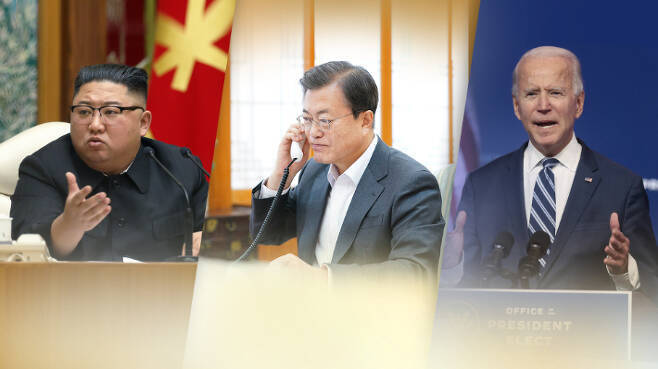 |
This image shows North Korean leader Kim Jong-un (L), South Korean President Moon Jae-in (C), and US President Joe Biden. (Yonhap) |
North Korea on Monday slammed the US lifting of all restrictions on South Korean missiles as a "stark reminder" of Washington's hostile approach to Pyongyang, saying the recently unveiled US policy on the North is "just trickery."
This marked the North's first reaction after South Korean President Moon Jae-in and US President Joe Biden agreed at their May 21 summit to use diplomacy to resolve the North's nuclear standoff and to terminate all "missile guideline" restrictions on the flight range and warhead weight of South Korean missiles.
Still, the North's criticism appeared to be restrained as it was couched in a Korean Central News Agency (KCNA) article under the name of an international affairs critic, rather than official government statements.
"The US, doggedly branding the measures taken by the DPRK for self-defence as violation of UN 'resolutions,' grants its allies unlimited right to missile development. It is engrossed in confrontation despite its lip-service to dialogue," the article said.
"The termination step is a stark reminder of the US hostile policy toward the DPRK and its shameful double-dealing," it said. "Lots of countries now view the US key DPRK policy, namely 'pragmatic approach' and 'maximum flexibility' produced by the Biden administration with much effort as just trickery."
DPRK is the acronym of the North's official name, Democratic People's Republic of Korea.
The missile restrictions were first introduced in 1979 as South Korea sought to secure US missile technologies for its own missile development. In return, Seoul agreed to limit the maximum flight range of its missiles to 180 km and the weight of warheads to 500 kg.
In the face of evolving nuclear and missile threats by North Korea, however, Seoul and Washington revised the guidelines four times through last year to extend the range to 800 km, scrap the limit on warhead weight and lift the ban on using solid fuel for space launch vehicles.
Now that all those restrictions have been terminated, South Korea can develop and possess any type of missile, including intercontinental ballistic missiles (ICBMs) and advanced submarine-launched ballistic missiles (SLBMs).
The Moon-Biden summit came after the Biden administration wrapped up its monthslong policy review on North Korea and vowed to push for a "calibrated, practical approach," which is open to and will explore diplomacy with Pyongyang.
The KCNA criticized the lifting of the missile guidelines, in particular, as intended to "legitimately realize the deployment of intermediate-range missiles," calling it a "serious blunder" that will result in heightening tensions on the Korean Peninsula.
"It is a serious blunder for it to pressurize the DPRK by creating asymmetric imbalance in and around the Korean peninsula as this may lead to the acute and instable situation on the Korean peninsula now technically at war," it said.
"The target of the DPRK is not the ROK army but the US," it added, using the acronym of South Korea's official name, Republic of Korea. "We will counter the US on the principle of strength for strength and good faith in kind. The escalated tension on the Korean peninsula will lead to instability of the forces threatening the DPRK."
The KCNA also directed criticism toward Moon.
"We also take this opportunity to make mention of the chief executive of South Korea putting himself within the gun-sights of regional countries, saying it 'imparts with glad mind the fact about the termination of missile guidelines,'" it added.
"So disgusting is his indecent act of seeking to sense reactions from this side and that side, with guilty conscience for what it did."
Lee Jong-joo, spokesperson of South Korea's unification ministry, said it is not appropriate to comment on a KCNA report issued in the name of an individual commentator, noting the ministry will continue to closely monitor how North Korea will react to the results of the Moon-Biden summit. (Yonhap)








